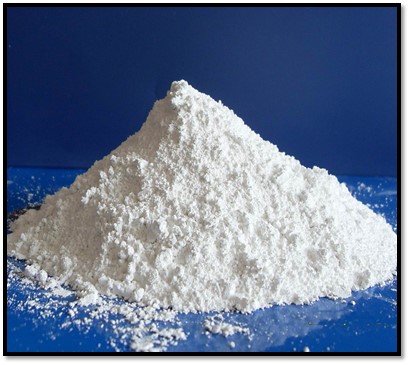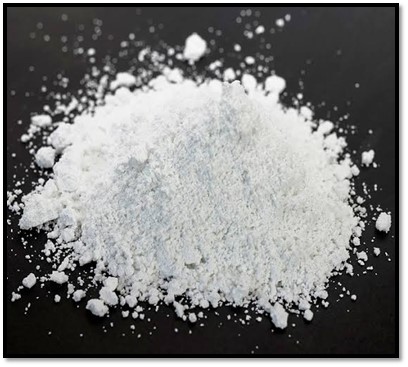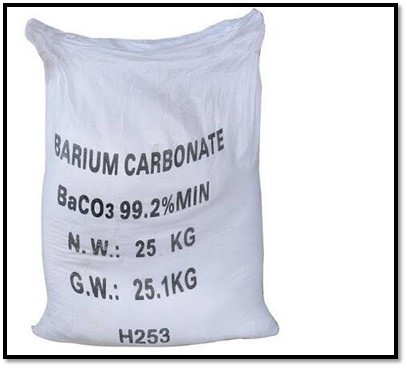1. What is Barium Carbonate?
Barium carbonate, also known as Witherite, is an inorganic compound that is made up of barium, carbon, and oxygen. It’s a very useful Industrial Chemical that’s largely used in the glass industry.

Barium carbonate
2. What is Barium Carbonate used for?
Barium carbonate has several applications, which are listed below:
- Barium carbonate is a white insoluble salt that is commonly used to manufacture ceramics.
- It works as a matting and crystallizing agent and acts as a flux.
- It reacts with particular coloring oxides to produce distinctive colors that are difficult to achieve with conventional materials.
- Electronic ceramics, capacitors, PTC thermistors, and other sorts of electronic equipment can all be made with barium carbonate. \
- It is a key raw material in the manufacturing of magnetic components and fiber optical glass.
- Barium carbonate is also used in the production of pyrotechnical goods and is useful in the formation of slurry.
- It can be utilized as a water purifier, rodenticide, and oxidation process catalyst
- It is a common precursor to barium-containing compounds such as ferrites.
3. What is the Chemical Formula of Barium Carbonate?
The molecular formula of Barium carbonate is BaCO3.
4. Is Barium Carbonate harmful to life?
Despite the fact that barium carbonate is insoluble in water, it is hazardous to humans because it is absorbed in the gastrointestinal system very quickly. Barium carbonate can be deadly if consumed in excessive doses, causing abnormalities in heart rhythm or paralysis in humans.
5. Where is Barium Carbonate found? What does Barium Carbonate look like?
Barium carbonate occurs in surroundings as the mineral witherite. It’s manufactured industrially by treating barium sulfide with sodium carbonate at 60 to 70 °C using the soda ash process, or more typically from carbon dioxide at 40 to 90 °C.
It looks like heavy white powder.

Barium carbonate
6. What are the Hazardous effects of Barium Carbonat ?
Barium carbonate is toxic to both humans and the environment. It irritates the mucous membranes, the eyes, and the skin. Moreover, acute intoxication, convulsions, heart failure, and a significant risk of shock can all result from inhaling or ingesting this salt.
7. What are precautionary measures necessary to be taken to handle Barium Carbonate?
To minimize undesirable outcomes, proper handling and storage of this substance are crucial. When working with this chemical, use adequate industrial hygiene measures and the use of protective equipment. On top of that, this substance should also be kept away from acids and oxidizing agents.
8. What will happen if Barium Carbonate is heated?
When heated, barium carbonate decomposes into barium oxide and carbon dioxide.
9. Is Barium Carbonate soluble compound?
It is insoluble in water and methanol but soluble in most of the acids.
10. Where can I buy Barium Carbonate?
Barium carbonate is available for purchase from Camachem. If you need a large quantity of these chemicals, they can be shipped in various packaging options. Camachem has been directly exporting Barium carbonate to consumers all around the world for many years.

Barium Carbonate Packaging
11. How much does Barium Carbonate cost?
The price is usually affected by the cost of raw materials, logistics, and other industrial inputs like labor and taxes. The cost per tonne is estimated to be $150.00.

Barium Carbonate transport
12. What is the PH of Barium Carbonate?
This substance is a weak base with a Ph of roughly 10.
13. Is Barium Carbonatean Electrolyte compound?
Barium carbonate is a weak electrolyte as it dissociates partially in the solution.
14. Can Barium Carbonatego down the drain?
Barium Sulfate should not be dumped down the drain because of its insolubility in water. It should be disposed of as a non-hazardous waste according to the stated rules.
15. What is the difference between Barium Carbonate and Barium Sulfate?
Although both Barium carbonate and Barium sulfate are inorganic compounds with similar physical appearances, there are numerous differences in their manufacturing and applications. Barium carbonate is more commonly used in ceramics, whilst Barium sulfate is more frequently used in the medical field.

Leave a comment